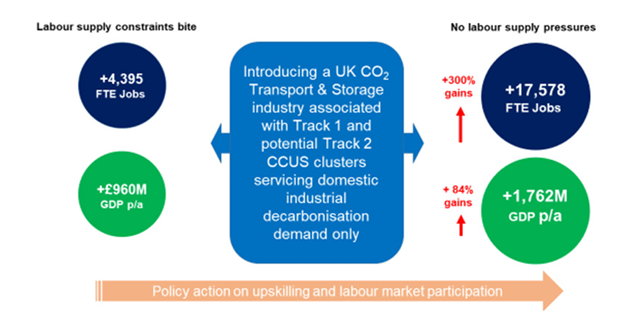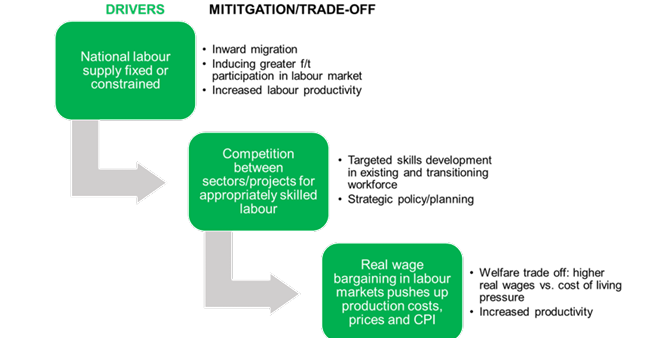The recent Climate Change Committee (CCC) report to UK parliament called for urgent delivery from UK Government against commitments across the Net Zero space – from carbon capture, utilisation and storage (CCUS) to heat pump deployment to improving energy efficiency. Yet this action requires significant number of people to drive it and concerns have been raised about whether the UK has the skilled workforce it needs. Our research shows that targeted policy action to address the lack of appropriately skilled workers across a wide range of sectors could not only accelerate progress towards the Net Zero transition but also boost the wider economy.
Labour supply and Net Zero
Across the multiple policy documents that underpin the UK’s Net Zero transition, including the Ten Point Plan for a Green Industrial Revolution, the Net Zero Strategy and the Energy Security Strategy, the promise of significant numbers of jobs – in the region of half a million - to be created as a result of these decarbonisation efforts is explicit. Critical jobs which will, for example, help build the carbon capture plants to decarbonise industry (including the recent announcement by UK Government) and install the heat pumps to aid the transition to low-carbon heating. Jobs which are in addition to the workforce required to deliver other significant infrastructure projects including HS2, Hinkley Point C and a programme of new hospital building, so the demands on the UK’s labour supply are growing.
This poses a particular challenge given the current labour constraints in the UK and the risks, as the CCC’s Net Zero Workforce report highlights, associated with an ‘inadequate supply of skilled workers’. COVID and Brexit have undoubtedly contributed to the current labour supply constraints, but some of these problems are longstanding. While some commentators have suggested that there are signs that the labour market is cooling based on recent figures from the Office of National Statistics in which vacancy rates fell for the twelfth month in a row, it’s worth noting that the total number of vacancies is just over 230,000 above that of pre-pandemic levels in January to March 2020.
Wider economy impacts of action on labour and skills
Our research through projects funded by the Industrial Decarbonisation Research and Innovation Centre (IDRIC) and the UK Carbon Capture and Storage Research Community (UKCCSRC) exploring the impact of labour supply constraints on industrial decarbonisation, in particular CCUS deployment, highlights the positive impact that action on increasing labour participation and investing in skills could have on the wider economy. This is alongside ensuring essential Net Zero projects are delivered to time and budget and contribute to critical emissions reductions.
Investment in CCUS can in itself drive positive economy-wide impacts. Our research finds that an estimated £4.2BN of infrastructure investment to enable a new UK CO2 Transport and Storage industry built around the Track 1 and 2 CCUS clusters could generate net revenues of up to £2.6BN between 2023 and 2029. Our economic modelling suggests net employment gains, peaking at 7,758 Full Time Equivalent (FTE) jobs in the first year of Track 1 infrastructure investment activity. By 2035, the operational T&S industry could support around 7,500 FTE jobs. These gains could play an important role in raising income tax revenues.
Figure 1: Initial investment and returns related to supporting emergence of a new UK CO2 Transport and Storage industry with capacity to sequester 54Mtof CO2

These findings assume that Government takes some action on skills development. The gains are significantly smaller if no action is taken (we estimate only 4,395 jobs may be supported if labour supply constraints fully bite). The research points to the fact that if labour supply constraints are addressed to some extent through action on skills to ease wage-cost pressure then the economy could be moved on to a higher revenue and GDP generation trajectory and the 7.5K jobs secured more quickly with less pressure on the public budget. However, ultimately, if labour supply and skills constraints could be more fully addressed, the benefits could be much more substantial, for example with up to 17.5K jobs supported across the wider economy.
The benefits of acting on labour supply and skills challenges
Figure 2. Sustained job creation (full-time equivalent, FTE) associated with a new UK CO2 Transport and Storage industry

Simulating scenarios comparing the wider economy benefits of CCUS deployment where there are different extents of labour supply constraints with ones where there are no constraints on the availability of appropriately skilled workers helps underscore the benefit of policy action on labour supply challenges. The positive economic impacts of CCUS deployment in a scenario where there are no labour supply challenges far exceed those where labour supply constraints bite. There is potential to create three times the number of jobs and realise an 84% increase in the real value of annual GDP gains.
Such action could include a combination of increasing labour market participation, investing in skills, boosting productivity and supporting temporary in-migration. In the case of the latter, particularly in relation to the construction industry where demands will initially be highest.
Figure 3. Labour market shortages and displacement: drivers, solutions and trade-offs

However, all of these actions will need to be considered within a wider policy context and alongside priorities around supporting decent, well-paid work and developing local supply chains. Addressing these wider priorities is crucial in ensuring that the economic returns of decarbonisation efforts are distributed more evenly across different geographical regions and income groups, not least if ambitions around ‘levelling up’ are to be realised. UK Government, in coordination with devolved administrations, local authorities and mechanisms such as the Green Jobs Delivery Group, has a critical role to play in designing and delivering a strategic approach to labour that ensures that the opportunities offered by the transition to Net Zero are realised. Namely, it is crucial that these translate to offering good quality and sustainable jobs and careers (as reflected in the recent Future Energy Skills Programme report), and that the risks of displacement of employment, competitiveness losses and inflationary pressures to other sectors of the economy are at least minimised and at best avoided.
